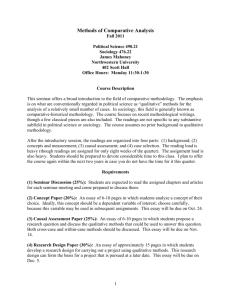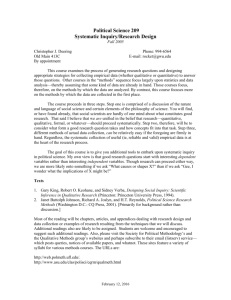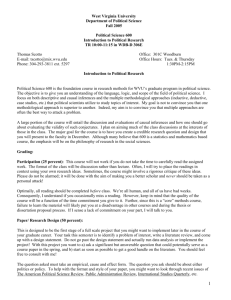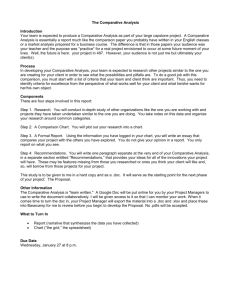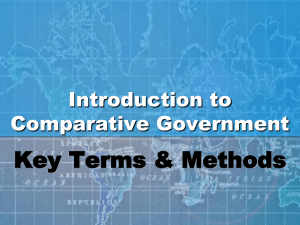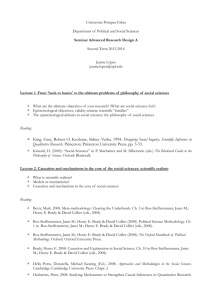METHODS OF COMPARATIVE ANALYSIS
advertisement
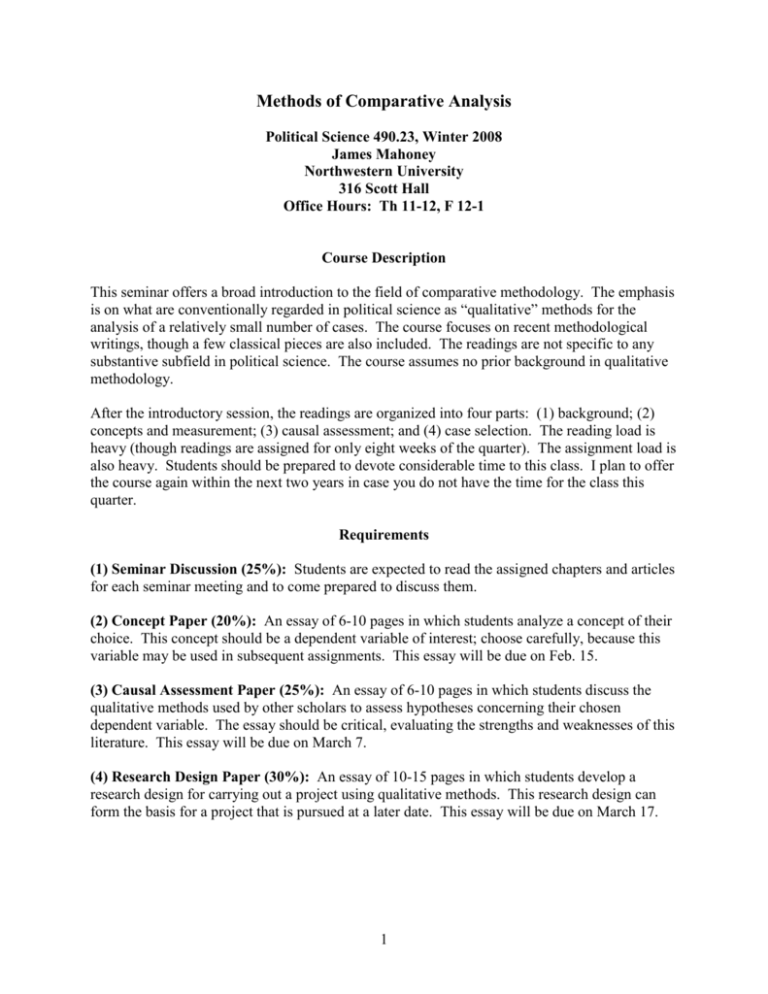
Methods of Comparative Analysis Political Science 490.23, Winter 2008 James Mahoney Northwestern University 316 Scott Hall Office Hours: Th 11-12, F 12-1 Course Description This seminar offers a broad introduction to the field of comparative methodology. The emphasis is on what are conventionally regarded in political science as “qualitative” methods for the analysis of a relatively small number of cases. The course focuses on recent methodological writings, though a few classical pieces are also included. The readings are not specific to any substantive subfield in political science. The course assumes no prior background in qualitative methodology. After the introductory session, the readings are organized into four parts: (1) background; (2) concepts and measurement; (3) causal assessment; and (4) case selection. The reading load is heavy (though readings are assigned for only eight weeks of the quarter). The assignment load is also heavy. Students should be prepared to devote considerable time to this class. I plan to offer the course again within the next two years in case you do not have the time for the class this quarter. Requirements (1) Seminar Discussion (25%): Students are expected to read the assigned chapters and articles for each seminar meeting and to come prepared to discuss them. (2) Concept Paper (20%): An essay of 6-10 pages in which students analyze a concept of their choice. This concept should be a dependent variable of interest; choose carefully, because this variable may be used in subsequent assignments. This essay will be due on Feb. 15. (3) Causal Assessment Paper (25%): An essay of 6-10 pages in which students discuss the qualitative methods used by other scholars to assess hypotheses concerning their chosen dependent variable. The essay should be critical, evaluating the strengths and weaknesses of this literature. This essay will be due on March 7. (4) Research Design Paper (30%): An essay of 10-15 pages in which students develop a research design for carrying out a project using qualitative methods. This research design can form the basis for a project that is pursued at a later date. This essay will be due on March 17. 1 Books to Purchase Henry Brady and David Collier, eds., Rethinking Social Inquiry: Diverse Tools, Shared Standards (Lanham: Rowman and Littlefield, 2004). John Gerring, Social Science Methodology: A Criterial Framework (Cambridge: Cambridge University Press, 2001). Alexander L. George and Andrew Bennett, Case Studies and Theory Development in the Social Science (Cambridge, Mass: MIT Press, 2005). Gary Goertz, Social Science Concepts: A User’s Guide (Princeton: Princeton University Press, 2005). Gary King, Robert Keohane, and Sydney Verba, Designing Social Inquiry: Scientific Inference in Qualitative Research (Princeton: Princeton University Press, 1994). Charles C. Ragin, Fuzzy-Set Social Science (Chicago: University of Chicago Press, 2000). Course Outline 1. Introduction to the Course (Jan. 11) No reading assignments; overview of syllabus and resources for people interested in qualitative methods. Part I: Background 2. Starting with Substantive Examples (Jan. 18) Dreze, Jean, and Amartya Sen, “China and India,” in Dreze and Sen, Hunger and Public Action (New York: Oxford University Press, 1989). [Course Packet] Locke, Richard M., and Kathleen Thelen, “Apples and Oranges Revisited: Contextualized Comparisons and the Study of Comparative Labor Politics,” Politics and Society 23:3 (September 1995): 337-67. [Download] Matthew Lange, James Mahoney, and Matthias vom Hau, “Colonialism and Development: A Comparative Analysis of Spanish and British Colonies,” American Journal of Sociology 111:5 (March 2006): 1412-1462. [Download] Tannenwald, Nina, “The Nuclear Taboo: The United States and the Normative Basis of Nuclear Non-Use,” International Organization 53:3 (Summer 1999): 433-68. [Download] Hicks, Alexander, Joya Misra, and Tang Nah Ng, “The Programmatic Emergence of the Social Security State,” American Sociological Review 60:3 (June 1995): 329-49. [Download] 2 3. Overview of the Field (Jan. 25) Lijphart, Arend, “Comparative Politics and the Comparative Method,” American Political Science Review 65: 3 (Sept. 1971): 682-93. [Download] Collier, David, “The Comparative Method,” pp. 105-19 in Ada W. Finifter, ed., Political Science: The State of the Discipline II (Washington, D.C.: American Political Science Association, 1993). [Download from David Collier’s webpage: http://www.polisci.berkeley.edu/Faculty/bio/permanent/Collier,D/] James Mahoney and Gary Goertz, “A Tale of Two Cultures: Contrasting Quantitative and Qualitative Research,” Political Analysis 14:3 (Summer 2006): 227-249. [Download] Brady, Henry, David Collier, and Jason Seawright, “Refocusing the Discussion of Methodology,” pp. 3-20 in Henry Brady and David Collier, eds., Rethinking Social Inquiry: Diverse Tools, Shared Standards (Lanham: Rowman and Littlefield, 2004). Collier, David, Jason Seawright, and Gerardo L. Munck, “The Quest for Standards: King, Keohane, and Verba’s Designing Social Inquiry,” pp. 21-50 in Henry Brady and David Collier, eds., Rethinking Social Inquiry: Diverse Tools, Shared Standards (Lanham: Rowman and Littlefield, 2004). George, Alexander L., and Andrew Bennett, “Case Studies and Theory Development,” pp. 3-36 in George and Bennett, Case Studies and Theory Development in the Social Science (Cambridge, Mass: MIT Press, 2005). 4. NO CLASS (Feb. 1) Part II: Conceptualization and Measurement 5. Approaches to Concepts and Measurement (Feb. 8) Collier, David, and James E. Mahon, “Conceptual ‘Stretching’ Revisited: Alternative Views of Categories in Comparative Analysis,” American Political Science Review 87:4 (December 1993): 845-55. [Download] Gerring, John., “Concepts: General Criteria” and “Strategies of Definition,” pp. 35-86 in Gerring, Social Science Methodology: A Criterial Framework (Cambridge: Cambridge University Press, 2001). Goertz, Gary, Social Science Concepts: A User’s Guide (Princeton: Princeton University Press, 2005), chaps. 1-3. 3 King, Gary, Robert O. Keohane, and Sidney Verba, “Descriptive Inference,” in King, Keohane, and Verba, Designing Social Inquity: Scientific Inference in Qualitative Research (Princeton: Princeton University Press, 1994), chap. 2. Collier, David, Henry E. Brady, and Jason Seawright, “Conceptualization and Measurement,” pp. 202-09 in in Henry Brady and David Collier, eds., Rethinking Social Inquiry: Diverse Tools, Shared Standards (Lanham: Rowman and Littlefield, 2004). Adcock, Robert N., and David Collier, “Measurement Validity: A Shared Standard for Qualitative and Quantitative Research,” American Political Science Review 95:3 (September 2001): 529-46. [Download] 6. Illustrations from Work on Democracy (Feb. 15) Munck, Gerardo L., and Jay Verkuilen, “Measuring Democracy: Evaluating Alternative Indices,” Comparative Political Studies 35:1 (February 2002): 5-34. [Download] Collier, David, and Steven Levitsky, “Democracy with Adjectives: Conceptual Innovation in Comparative Research,” World Politics 49:3 (April 1997): 430-51. [Download] Bowman, Kirk, Fabrice Lehoucq, and James Mahoney, “Measuring Political Democracy: Case Expertise, Data Adequacy, and Central America,” Comparative Political Studies 38:8 (October 2005): 939-970. [Download] Paxton, Pamela, “Women’s Suffrage in the Measurement of Democracy: Problems of Operationalization,” Studies in Comparative International Development 35:3 (September 2000): 92-111. [Download] Part III: Causal Assessment 7. Cross-Case Analysis I (Feb. 22) King, Gary, Robert O. Keohane, and Sidney Verba, “Causality and Causal Inference,” in King, Keohane, and Verba, Designing Social Inquiry: Scientific Inference in Qualitative Research (Princeton: Princeton University Press, 1994), chap. 3. George, Alexander L., and Andrew Bennett, “Comparative Methods” and “The Congruence Method,” pp. 151-204 in George and Bennett, Case Studies and Theory Development in the Social Science (Cambridge, Mass: MIT Press, 2005). George, Alexander L., and Andrew Bennett, “Integrating Comparative and Within-Case Analysis: Typological Theory,” pp. 233-62 in George and Bennett, Case Studies and Theory Development in the Social Science (Cambridge, Mass: MIT Press, 2005). 4 Mahoney, James “Strategies of Causal Inference in Small-N Analysis,” Sociological Methods and Research 28: 4 (May 2000), pp. 387-424. [Download] Gerring, John, “Methods,” pp. 200-29 in Gerring, Social Science Methodology: A Criterial Framework (Cambridge: Cambridge University Press, 2001). Elman, Colin. “Explanatory Typologies in Qualitative Studies of International Politics,” International Organization 59 (2005): 293-326. [Download] 8. Within Case Analysis (Feb. 29) George, Alexander L., and Andrew Bennett, “Process-Tracing and Historical Explanation,” pp. 205-232 in George and Bennett, Case Studies and Theory Development in the Social Science (Cambridge, Mass: MIT Press, 2005). Rueschemeyer, Dietrich, and John D. Stephens, “Comparing Historical Sequences – A Powerful Tool for Causal Analysis,” Comparative Social Research 17: 55-72. [Course Packet] David Collier, Henry E. Brady, and Jason Seawright, “Sources of Leverage in Causal Inference: Toward an Alternative View of Methodology,” pp. 229-66 in Henry Brady and David Collier, eds., Rethinking Social Inquiry: Diverse Tools, Shared Standards (Lanham: Rowman and Littlefield, 2004). Brady, Henry E., “Data-Set Observations versus Causal-Process Observations: The 2000 U.S. Presidential Election,” pp. 267-71 in Henry Brady and David Collier, eds., Rethinking Social Inquiry: Diverse Tools, Shared Standards (Lanham: Rowman and Littlefield, 2004). Lieberman, Evan. “Nested Analysis as a Mixed-Method Strategy for Comparative Research,” American Political Science Review 93: 3 (August 2005): 435-52. [Download] 9. Cross-Case Analysis II (March 7) Ragin, Charles C., Fuzzy-Set Social Science (Chicago: University of Chicago Press, 2000), chaps. 3-11. James Mahoney, “Long-Run Development and the Legacy of Colonialism in Spanish America,” American Journal of Sociology 109:1 (2003), pp. 51-106. [Download] 5 Part IV: Case Selection 10. Case Selection (March 14) King, Gary, Robert O. Keohane, and Sidney Verba, “Determining What to Observe,” in King, Keohane, and Verba, Designing Social Inquity: Scientific Inference in Qualitative Research (Princeton: Princeton University Press, 1994), chap. 4. Geddes, Barbara, “How the Cases You Choose Affect the Answers You Get: Selection Bias and Related Issues,” in Geddes, Paradigms and Sand Castles: Theory Building and Research Design in Comparative Politics (Ann Arbor: University of Michigan Press, 2003), chap. 3. [Course Packet] Collier, David, James Mahoney, and Jason Seawright, “Claiming Too Much: Warnings About Selection Bias,” pp. 85-102 in Henry Brady and David Collier, eds., Rethinking Social Inquiry: Diverse Tools, Shared Standards (Lanham: Rowman and Littlefield, 2004). Ragin, Charles, “Constituting Populations,” in Ragin, Fuzzy-Set Social Science (Chicago: University of Chicago Press, 2000), chap. 2. Mahoney, James, and Gary Goertz, “The Possibility Principle: Choosing Negative Cases in Qualitative Research,” American Political Science Review 98:4 (November 2004): 653-670. [Download] 6
